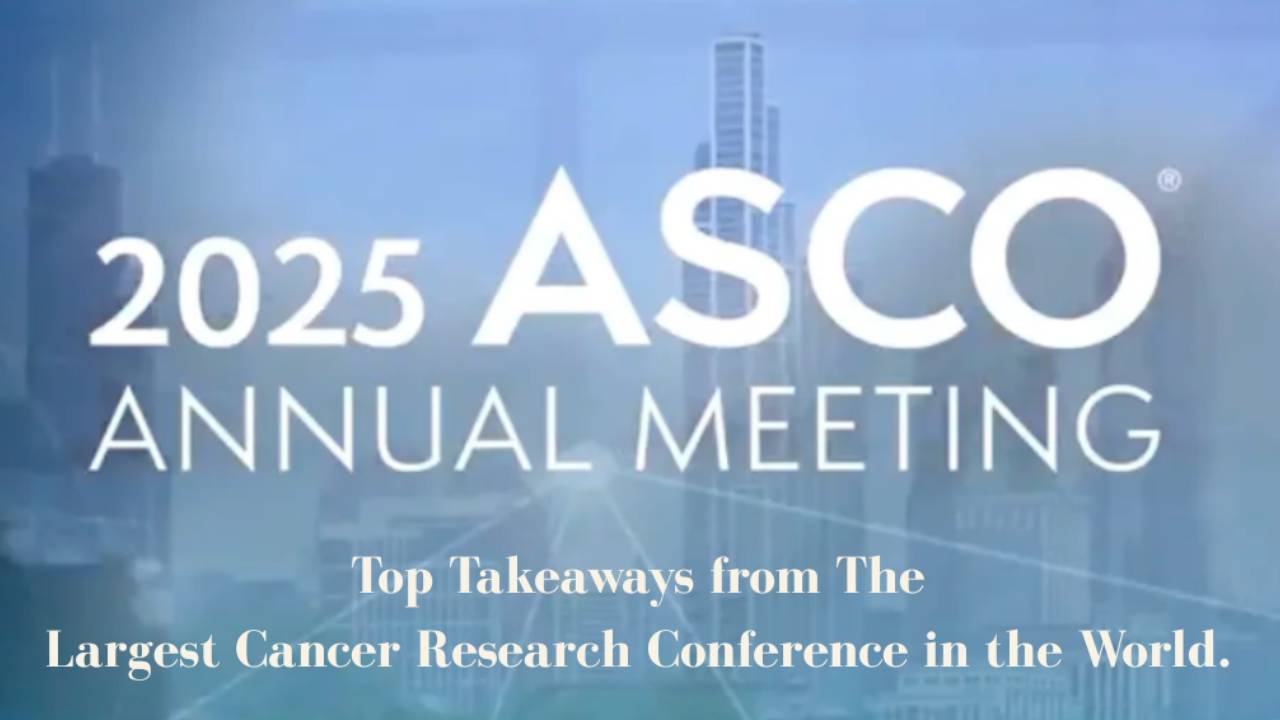What ASCO 2025 Means for You: Choices, and Whole-Person Cancer Care
Jul 11, 2025
If you're living with cancer you may have seen headlines about new breakthroughs from the ASCO (American Society of Clinical Oncologists) 2025 Annual Meeting, the largest cancer research conference in the world. But what does all that science really mean for your everyday life, your care team, and your future?
Here’s what you need to know: you have more options, more power, and more reasons to hope than ever before. The 2025 conference didn’t just focus on new drugs—it spotlighted the value of movement, nutrition, collaboration, and YOU as a partner in care.
Exercise Isn’t Just “Good for You.” It’s Lifesaving.
A landmark clinical trial presented at ASCO 2025 showed that prescribed exercise 3–4 times per week reduced the risk of death by 37% in colon cancer survivors—and cut the risk of recurrence by 28%.
That’s not a typo. Those numbers rival what we expect from chemotherapy.
Even more important? These results were seen in real people doing achievable things—walking, strength training, guided movement. The key was structure and support: working with a trained coach or therapist to stick with it.
What You Can Do: Ask your care team to treat movement like medicine. You deserve a referral to someone who can help you build a plan that works for your energy and body.
Muscle Mass Is More Than Strength—It’s Survival
Researchers continue to emphasize a critical but overlooked truth: low muscle mass predicts worse outcomes in cancer patients—even if you’re at a “normal” weight. Having more lean muscle helps your body:
- Tolerate treatment better
- Clear chemo more efficiently
- Recover faster from surgery or infections
What helps maintain muscle? Protein, strength-building movement, rest, and inflammation-lowering habits—all areas where a naturopathic doctor (ND) can be a powerful ally.
Sometimes, Waiting Is the Best Medicine
Not every cancer patient needs chemo right away—and at ASCO 2025, multiple studies showed that strategically delaying chemotherapy in hormone-positive and other slow-growing cancers did not increase risk for some patients.
This shift opens the door for less toxic treatment plans, better quality of life, and time to explore integrative care, build strength, or just catch your breath.
What You Can Do: Ask, “Do I need chemo right now—or can we monitor and support my body while watching closely? Is immunotherapy an option?”
Care Is Best When It's Collaborative
Gone are the days of “just do what the doctor says.” Patients and caregivers are partners in this process now. Whether you work with an oncologist, a naturopath, a physical therapist, or a clinical trial team—shared decision-making is key.
The best outcomes come from a care team that talks to each other, respects your values, and includes you in the conversation and decision-making. The study presented at ASCO also showed the importance of including mental health support for cancer care. Some 48% of patients experience clinical-level psychological distress. Which means nearly half of patients are living with distress that can affect treatment, recovery, and quality of life. You deserve care that sees every part of you, mind and body, not just the cancer.
How Naturopathic Doctors Can Support Your Cancer Experience
Cancer is not just a disease of cells—it affects identity, strength, mood, digestion, connection, and hope. Naturopathic Doctors (NDs) trained in integrative oncology can help you:
- Build strength and reduce fatigue
- Support cellular health, immunity and digestion
- Manage side effects, like neuropathy or nausea, with natural compounds
- Track inflammation, sleep, and muscle loss
- Plan nutrition for treatment and recovery
Many NDs collaborate with oncologists and understand how to safely integrate natural therapies with standard care. They can also coach you on healthy behaviors that improve long-term outcomes—like the exercise and muscle-preservation strategies ASCO emphasized.
What YOU Can Do Right Now
You don’t need to wait for permission to start supporting your body and mind. Here are steps everyone and anyone managing cancer can explore now:
- Start moving: Ask about physical therapy or exercise oncology programs in your area.
- Eat to nourish, not restrict: Protein, anti-inflammatory foods, and hydration really matter.
- Ask for help with side effects: NDs and supportive care teams can improve comfort and recovery.
- Find your community: Peer support improves emotional well-being and survival.
- Track trends: Keep a journal of sleep, energy, mood, and labs to share with your team. Note news from conferences like ASCO:
Amgen’s Nplate prevents severe chemo-induced low platelets
Romiplostim helped 84% of patients maintain chemo dose versus 36%—no FDA-approved treatment existed before this.
Elinzanetant reduces hormone-therapy–induced hot flashes
The Phase III OASIS-4 study showed this new drug significantly improved moderate-to-severe hot flashes in hormone-treated breast cancer patients.
Questions to Ask Your Medical Oncologist Now
The science from ASCO 2025 gives you permission to speak up and ask these evidence-based questions:
- Can we talk about how exercise or muscle mass might help my treatment outcomes?
- Is chemo my only option right now—or could we delay or monitor?
- Are there any liquid biopsy (ctDNA) tests to track my cancer in real time?
ASCO Example: Camizestrant cuts progression risk by 56% in HR+ breast cancer
Early detection of ESR1 mutations via liquid biopsy allowed timely switch to camizestrant, halving recurrence risk in hormone-receptor-positive cases.
- What are the goals of treatment—cure, control, or comfort?
- Which naturopathic or integrative providers do you work with for holistic care?
- Which dietitian or PT do you recommend as part of my care team?
- Is there a role for immunotherapy or new drug trials in my case?
- How often should we assess side effects and quality of life—not just tumor scans?
- Are there survivorship or support programs available at this cancer center?
- How can I be more involved in decision-making?
You Are Not Powerless—Even in Metastatic Disease
Many patients with advanced cancer feel like their choices shrink—but the ASCO 2025 meeting emphasized that personalized care, prevention of complications, and emotional health are just as important as tumor response.
This is especially true for people with metastatic breast, colon, or prostate cancer—where staying strong, informed, and supported can extend both life and the quality of it. Progress on metastatic Triple Negative Breast Cancer vaccine trials, was one of several positive updates for advanced cancer.
More Attention on You
The biggest takeaway from ASCO 2025? Cancer care is becoming more human. That means more attention to how you live, how you feel, and how you participate in your experience—not just how the cancer behaves on a scan.
If you’re newly diagnosed or living with long-term cancer, don’t be afraid to ask for a team that supports all of you—body, mind, and spirit.
You are not just a patient. You are a person. And your voice and experience matters.





